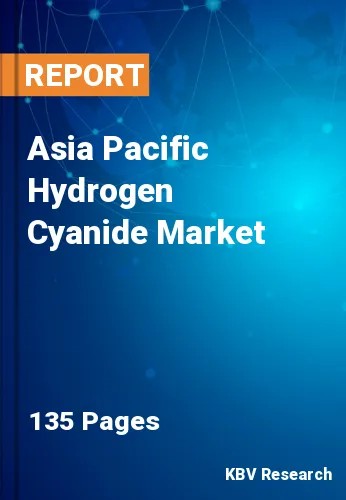
The Asia Pacific Hydrogen Cyanide Market would witness market growth of 2.5% CAGR during the forecast period (2023-2030). In the year 2021, the Asia Pacific market's volume surged to 224.9 Kilo Tonnes, showcasing a growth of 1.8% (2019-2022).
HCN is a vital uncooked cloth used in manufacturing a range of chemicals, such as acrylic fibers, plastics, artificial rubber, and dyes. These chemical compounds have wide-ranging purposes throughout industries such as textiles, automotive, construction, etc. As these sectors amplify and evolve, the demand for chemicals derived from HCN rises accordingly. The chemical enterprise depends on HCN for its unique chemical houses and reactivity, enabling the synthesis of integral products.
Moreover, HCN's unique chemical homes enable the development of particular pills that target many medical conditions. In addition, clinical research and drug discovery developments contribute to the pharmaceutical industry's growth. The demand for HCN in pharmaceutical synthesis is anticipated to rise as new tablets and treatments are developed. The consistent pursuit of novel and more fantastic, prescribed drugs fuels the demand for HCN as a fundamental raw material. As a result, the increasing demand for hydrogen cyanide from the pharmaceutical enterprise drives the market.
According to Invest India, India's cumulative production of Crude Steel was 113.44 million Tonnes (MT), Finished Steel at 109.35 MT, and finished steel consumption was 107.20 MT during Apr-Feb, FY23. Hydrogen cyanide is used in the pickling and cleaning processes of steel manufacturing. It helps remove rust, scale, and other impurities from the steel surface, preparing it for further processing. As the production of crude steel increases, the demand for pickling agents such as hydrogen cyanide may also rise. As steel production scales up, there may be an increased need for such chemical processes, potentially impacting the demand for hydrogen cyanide. The aforementioned factors will drive the market growth in this region.
The China market dominated the Asia Pacific Hydrogen Cyanide Market, By Country in 2022, and would continue to be a dominant market till 2030; thereby, achieving a market value of $109.8 million by 2030. The India market is exhibiting a CAGR of 2.7% during (2023 - 2030). Additionally, The Japan market would experience a CAGR of 2.1% during (2023 - 2030).
Based on Product, the market is segmented into Hydrogen Cyanide Liquid, and Hydrogen Cyanide Gas. Based on Application, the market is segmented into Adiponitrile, Sodium Cyanide & Potassium Cyanide, Acetone Cyanohydrin, Cyanogen Chloride, and Others. Based on countries, the market is segmented into China, Japan, India, South Korea, Australia, Taiwan, and Rest of Asia Pacific.
Free Valuable Insights: The Global Hydrogen Cyanide Market is Predict to reach $1.3 Billion by 2030, at a CAGR of 2.2%
The market research report covers the analysis of key stake holders of the market. Key companies profiled in the report include Air Liquide S.A., Evonik Industries AG (RAG-Stiftung), INEOS Group Holdings S.A., Sumitomo Chemical Co., Ltd., Ascend Performance Materials LLC (SK Capital and Partners), Kuraray Co., Ltd., Asahi Kasei Corporation, Mitsubishi Gas Chemical Company, Inc., Cyanco International, LLC (Cerberus Capital Management, L.P.) and Cornerstone Chemical Company (Littlejohn & Co., LLC).
By Product (Volume, Kilo Tonnes, USD Billion, 2019-2030)
By Application (Volume, Kilo Tonnes, USD Billion, 2019-2030)
By Country (Volume, Kilo Tonnes, USD Billion, 2019-2030)
Our team of dedicated experts can provide you with attractive expansion opportunities for your business.
